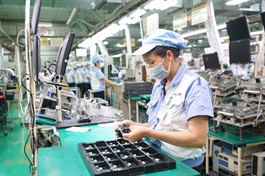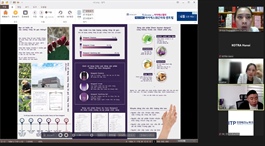Vietnam’s Malaysian ties hit higher gear
Vietnam’s Malaysian ties hit higher gear
The mutual recognition of vaccination certificates between Vietnam and Malaysia, in addition to both nations’ joint facilitation of bilateral trade and investment activities, will help them expand ties further in these sectors.
During last week’s official visit to Vietnam by Malaysia’s Prime Minister Ismail Sabri Yaakob, both sides agreed to “accelerate negotiations for a new agreement on air services and welcomed the early conclusion of the agreement on mutual recognition of COVID-19 vaccination certificates, which will facilitate the safe and regular commercial travel between both countries,” read a joint press statement between Vietnam and Malaysia released during the visit.
The mutual recognition of vaccination certificates will lead to a milestone in their normalisation of travelling and facilitating investment and trade, especially in the context that Vietnam has been completely opening its doors to international tourists and Malaysia will do the same on April 1.
Both nations have also vowed to provide the best conditions for investment inflows in their respective territories, as this will help them to reach a bilateral trade turnover of $18 billion or higher by 2025, from $16.71 billion last year, up 41.6 per cent on-year.
Last year, Malaysia ranked second in ASEAN and ninth in the world among the trade partners of Vietnam, which in turn was the third-largest trade partner of the former.
Vietnam exports mainly telephones and components, crude oil, rice coffee, and seafood to Malaysia while importing mostly computers, electronic products, machinery, equipment, petrol, household appliances and components, and chemicals. Their trade value was around $2.2 billion in the first two months of 2022, up 20 per cent on-year.
Vietnam and Malaysia have also pledged to beef up trade cooperation in the sectors of agro-forestry-fishery, halal, foodstuffs, electronics. Notably, they will jointly devise a mechanism for exchanging information on trade remedies between the two countries.
Raja Badrulnizam Raja Kamalzaman, director of ASEAN and Oceania at Malaysia External Trade Development Corporation, said that it had set out three agendas in combination with creating favourable conditions for Malaysian businesses to invest and export abroad, in order to enhance trade and especially to raise Malaysia’s exports to the Vietnamese market and to the wider Southeast Asian region.
The agendas focus on developing a sustainable business environment, digitising trade activities, and deploying specific initiatives on the basis of Malaysia’s national trade master plan.
“Both sides agreed to further facilitate the expansion of investment in the two countries, particularly in high potential areas such as automation, smart logistics, innovation, high technology, digital economy, digital transformation,” said the joint press statement. “The leaders also agreed to undertake joint efforts to take advantage of new trade agreements of which the two countries are members to further deepen their trade links.”
According to figures from the Vietnamese Ministry of Planning and Investment, as of February 20, Malaysia ranked third among the ASEAN nations – after Singapore ($65.23 billion) and Thailand ($13 billion) – and 10th among the 140 countries and territories investing in Vietnam, with 668 valid projects worth $12.85 billion.
Meanwhile, Vietnam has 21 valid projects with registered capital totalling $853 million in Malaysia, making the latter the ninth-biggest among the 78 overseas investment destinations of Vietnam.
Over the past years, Vietnam and Malaysia have also been boosting bilateral ties in oil and gas. For example, Malaysian state-owned oil and gas group Petronas is cooperating with PetroVietnam in the exploration, exploitation, and supply of oil and gas services.
The boosted cooperation will help both countries to hit the two-way trade target of $18 billion by 2025. The PetroVietnam-Petronas cooperation began in 1991.
In 2019, Petronas and PetroVietnam inked an agreement for the sale and purchase of additional gas to Vietnam’s Ca Mau gas-power-and fertiliser complex. The agreement refers to a non-binding document that outlines the basic terms of a tentative partnership agreement or transaction.
Under the deal, the complex would receive additional gas of one billion cubic metres per year to solve the gas shortage.
The $2 billion complex includes a PM3-CM gas pipeline, the CM1 and CM2 power plants, the Ca Mau fertiliser plant, and other facilities. The complex was constructed in 2001 in the southern-most province of Ca Mau. Its gas consumption demand is 2.2 billion cu.m per year. The complex uses natural gas resources from Lot PM3-CAA in an offshore area between Vietnam and Malaysia.
PetroVietnam and Petronas would continue to negotiate a gas purchase contract following the signing to ensure the stable and effective operation of the complex as well as the energy security of Vietnam.
According to the Vietnamese Ministry of Foreign Affairs, the official visit by Malaysian PM Yaakob to Vietnam reflected the importance of Malaysia-Vietnam relations as neighbours and partners in ASEAN with the two countries set to celebrate the 50th anniversary of the establishment of diplomatic relations in 2023. Vietnam and Malaysia established diplomatic relations in 1973 and upgraded their ties to a strategic partnership in 2015.






















